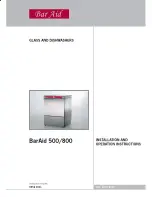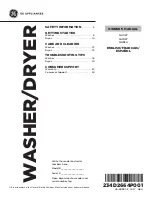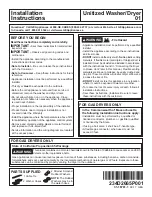
17
16
How to Keep Your Dishwasher in Shape
After Every Wash
After every wash, turn off the water supply
to the appliance and leave the door slightly
ajar so that moisture and odors are not
trapped inside.
Remove the Plug
Before cleaning or performing
maintenance, always remove the plug from
the socket. Do not run risks.
No Solvents or Abrasive Cleaning
To clean the exterior and rubber parts of
the dishwasher, do not use solvents or
abrasive cleaning products. Use only a
cloth and warm soapy water. To remove
spots or stains from the surface of the
interior, use a cloth dampened with water
and a little white vinegar, or a cleaning
product made specifically for dishwashers.
When You Go on holiday
When you go on holiday, it is
recommended that you run a wash cycle
with the dishwasher empty and then
remove the plug from the socket, turn off
the water supply and leave the door of the
appliance slightly ajar. This will help the
seals last longer and prevent odors from
forming in the appliance.
Moving the Appliance
If the appliance must be moved, try to keep
it in the vertical position. If absolutely
necessary, it can be positioned on its back.
Seals
One of the factors that cause odors to form
in the dishwasher is food that remains
trapped in the seals. Periodic cleaning with
a damp sponge will prevent this.
Attention:
The installation of the pipes
and electrical equipments
should be done by professionals.
Electrical Shock Hazard!
Disconnect electrical power before
installing dishwasher.
Failure to do so can result in death or
electrical shock.
Warning
8. Installation
Keep this instruction manual in a safe place for future reference. If the appliance is sold, given
away or moved, please ensure the manual is kept with the machine, so that the new owner may
benefit from the advice contained within it.
Please read this instruction manual carefully: it contains important information regarding the safe
installation, use and maintenance of the appliance.
If the appliance must be moved at any time, keep it in an upright position; if absolutely necessary,
it may be tilted onto its back.
Positioning and leveling
1. Remove the appliance from all packaging and check that it has not been damaged during
transportation. If it has been damaged, contact the retailer and do not proceed and further with the
installation process.
2. Check the dishwasher by placing it so that its sides or back panel are in contact with the adjacent
cabinets or even with the wall. This appliance can also be recessed under a single work top (see
the Assembly instruction sheet).
3. Position the dishwasher on a level and sturdy floor. If the floor is uneven, the front feet of the
appliance may be adjusted until it reaches a horizontal position (the angle of inclination must not
exceed 2 degrees). If the appliance is levelled correctly, it will be more stable and much less likely to
move or cause vibrations and noise while it is operation.
Connection to the water and electricity supplies should only be performed by a qualified
technician.
The dishwasher should not stand on top of the water hoses or the electricity supply cable
The appliance must be connected to the water supply network using new piping. Do not use old
piping.
Connecting the water inlet hose
Connect the cold water supply hose to a threaded 3/4(inch)
connector and make sure that it is fastened tightly in place.
If the water pipes are new or have not been used for an
extended period of time, let the water run to make sure that
the water is clear and free of impurities. If this precaution is
not taken, there is a risk that the water inlet can get blocked
and the appliance could be damaged.
Fit the drainage hose of your machine to the drainage pipe
without bending.
If the length of the hose is not sufficient, apply to the
authorized service for an extension made from the same
material as the original. Remember that the length of the
hose should not exceed 4meters even when with an
extension.
If the drainage hose is longer the 4 m. the dishes will not
be cleaned properly secure your hose firmly to the drainage
pipe to avoid it coming off during the washing process.
Connecting the water outlet hose
Electrical connection
Before inserting the plug into the electrical socket, make sure that:
the socket is earthed and complies with current regulations;
the socket can withstand the maximum load of the appliance, which is indicated on the data plate
located on the inside of the door(see description of the appliance);
the power supply voltage falls within the values indicated on the data plate on the inside of the door;
the socket is compatible with the plug of the appliance. If this is not the case, ask an authorised
technician to replace the plug (see assistance); do not use extension cables or multiple sockets.
Connecting the water and electricity supplies
m
a
x1
1
0
0
m
m
m
in
50
0m
m
m
in
12
0m
m
min 40mm
For optional






























